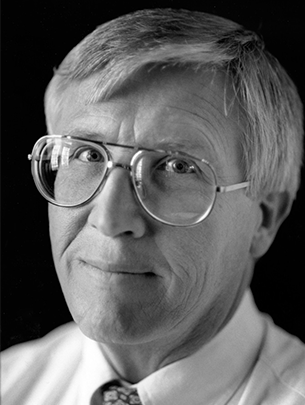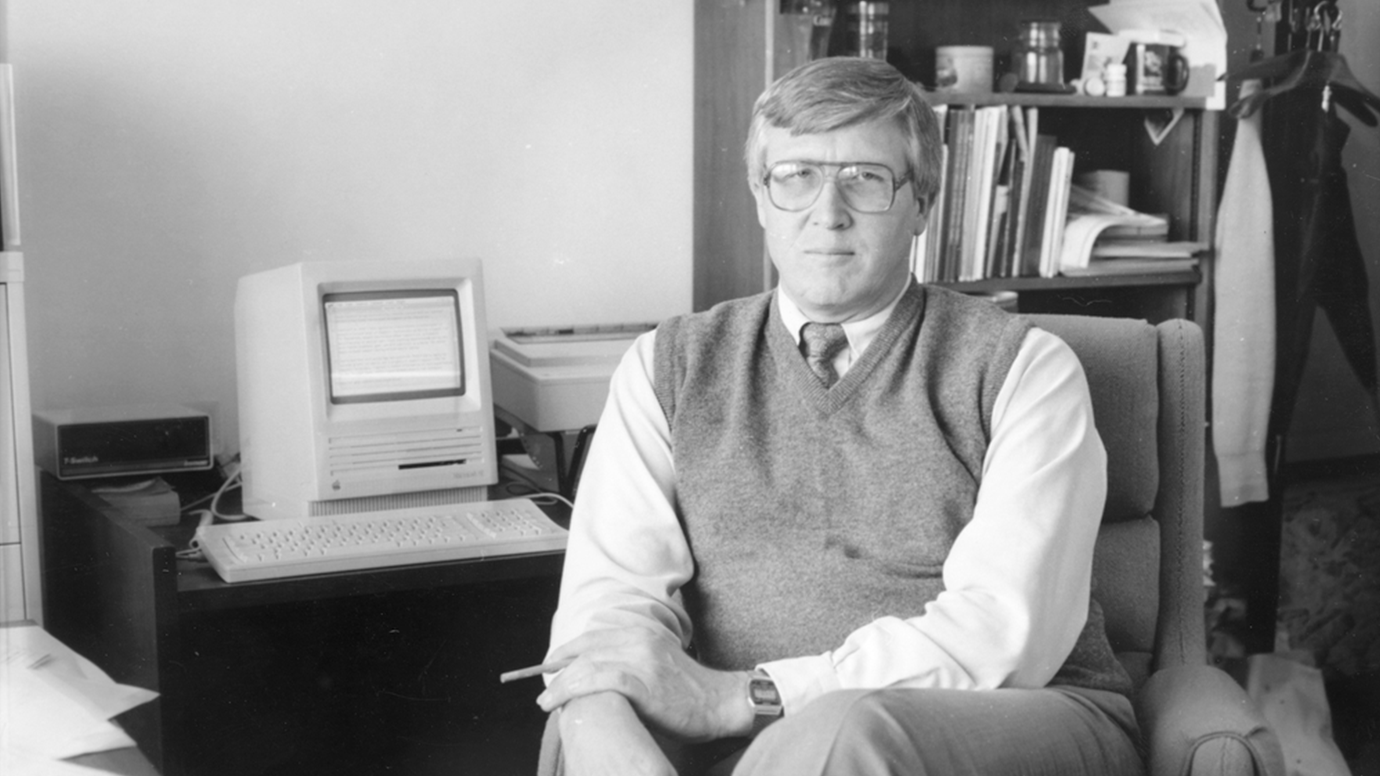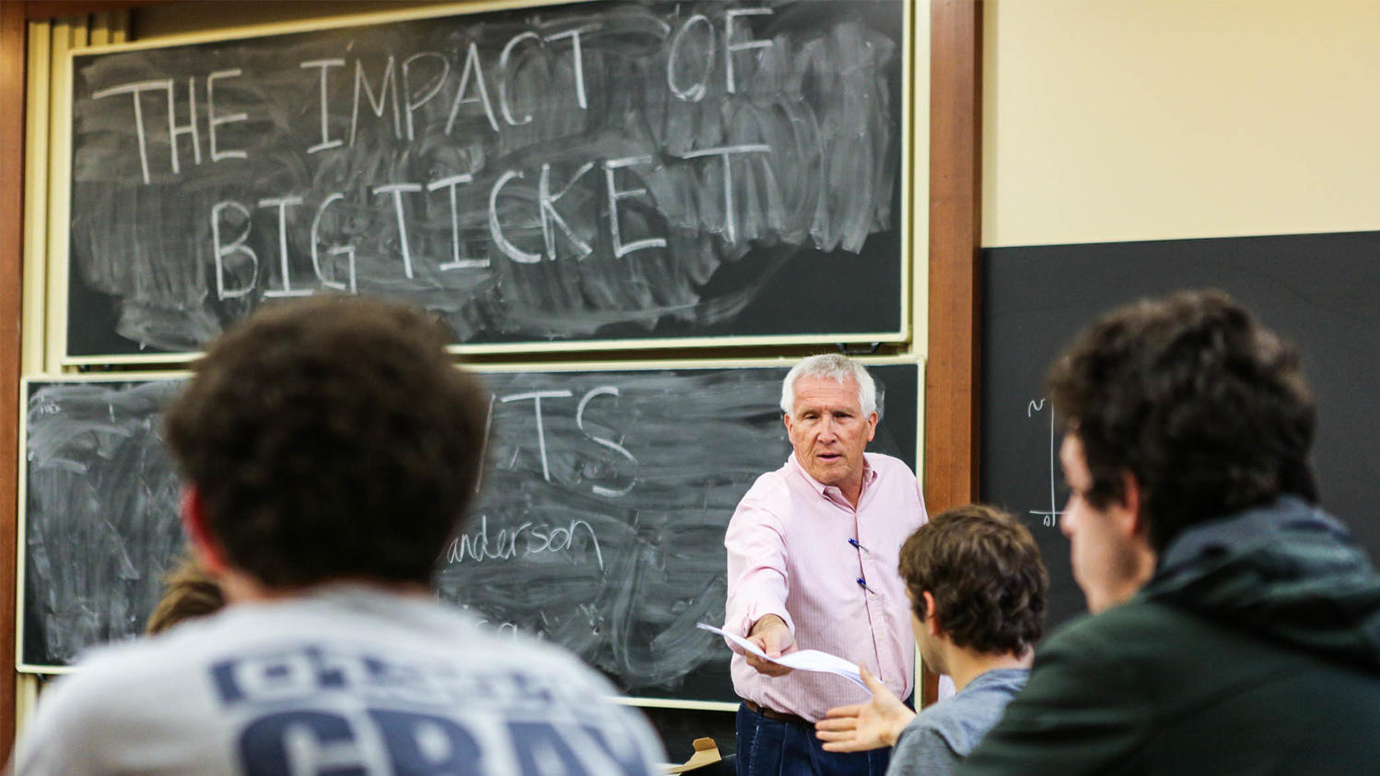For four decades, Allen Sanderson was a familiar face to generations of University of Chicago students through his popular introductory economics courses. By his own estimate, he taught more than 15,000 undergraduates—which he claimed was more than anyone in UChicago history.
One former student recalled that Sanderson often joked: “Going to UChicago and not taking at least one economics course is like going to Rome, visiting the Sistine Chapel, and not looking up.’”

Sanderson, AM’70, a senior instructional professor in the Kenneth C. Griffin Department of Economics and the College known for his ability to make economics accessible to students and the general public, passed away Jan. 23 in Chicago after a brief illness. He was 81.
Prof. Azeem Shaikh, chair of the Department of Economics, remembered Sanderson as “a beloved instructor, exemplary University citizen and a strong advocate for our undergraduate students.”
Colleagues and former students recalled how Sanderson wrote thousands of letters of recommendation for his students, many of whom he stayed in touch with after graduation; and reflected on his profound impact teaching courses on the Principles of Economics, The Economics of Sports and in the Big Problems program at UChicago. Known as a voracious writer with a sharp wit, Sanderson was often quoted by the national media on the economics of sports.
“I would describe Allen as a believer,” said Victor O. Lima, senior instructional professor in Economics and the College and co-director of Undergraduate Studies and Master's Programs. “He really, truly believed in Chicago economics as a way to understand the world and as a way to improve the world.”
Writing for the public
A graduate of Brigham Young University and UChicago, Sanderson taught at the College of William & Mary and Princeton University before joining the UChicago faculty in 1984. He served eight years as associate provost of the University and was a senior research scientist at NORC, where he focused on education, labor markets and affirmative action. From 1994 until his passing, he was a member of the instructional faculty in the Department of Economics.
Sanderson’s research and writing often was directed at a broader audience beyond academia, including policymakers and the media.
“Allen had this public policy interest and wanted to communicate to broader audiences, and he wrote very well—certainly for an economist, and maybe even without the qualification,” said Derek A. Neal, the William C. Norby Professor in Economics and the College. “That was his calling card.”

Sanderson was a prolific writer of opinion pieces on both sports and non-sports topics. He wrote columns for the Chicago Tribune, the Los Angeles Times and Chicago Life Magazine. He was also frequently interviewed by NPR, WBEZ, WGN-TV, and Chicago Tonight, among many others. He served on the editorial board of The Journal of Sports Economics and as a referee for several academic journals and professional presses across the country.
Along with John J. Siegfried, an emeritus professor of Economics at Vanderbilt University, Sanderson worked on about a dozen articles together, most of which focused on sports. He once famously quipped: “If you want to inject money into the local economy, it would be better to drop it from a helicopter than invest it in a new ballpark.”
One of Sanderson's most prominent articles, “The Case for Paying College Athletes,” published in the Journal of Economic Perspectives in 2015, advocated for compensating college players. Sanderson and Siegfried also signed the amicus brief that was presented in a 2021 Supreme Court case, in which the court unanimously ruled that players had the rights to their names, images and likenesses.
Making economics accessible
Sanderson brought his signature ability to make economics accessible to his UChicago courses, and he was honored with a Quantrell Award for Excellence in Undergraduate Teaching in 1998.
“Most of the students in my classes do not concentrate in economics, but they often need a working knowledge of economics when they’re being interviewed for their first job,” Sanderson told the University of Chicago Chronicle. “They’re happy that if asked, they can make an insightful comment about interest rates or recycling, for instance, rather than staring back at an interviewer like a deer looking into headlights.”
Former student Aatman Vakil, AB’23, said of Sanderson: “One of his greatest contributions was igniting a love for economics in students who have never studied the subjects before. He designed his introductory courses extremely meticulously, updating them each year to include relevant real-world examples and questions for students to think through. He strove to ensure that newcomers not only understood the basics but also enjoyed thinking like economists.”
For decades, Sanderson taught sections of 250 students, twice per quarter, three quarters per year.
“Teaching the big classes at a university where part of the appeal is we don't teach big classes, we teach small classes—you have to be really good to get the evaluations he did over the years,” Neal said. “You have to be an effective communicator.”

Both Neal and Lima recalled the popularity of Sanderson’s office hours, for which students would crowd into his office and often spill out in the hallway.
“For those who visited his office hours, it was rare to leave empty-handed,” recalled former student Madelyn St Amand, AB’24. “He was known for generously sharing the books in his office. His genuine care for his students extended far beyond the classroom.”
Sanderson also taught courses on pressing societal issues as part of the "Big Problems” program, including “Inequality: Origins, Dimensions & Policy” and “Sport, Society and Science.” More recently, Sanderson organized “UChicago Economics: The People and the Seminal Ideas,” a course which traced the history and evolution of economic thought, focusing on the emergence of the Chicago School of Economics in the 20th century.
Larry T. Wimmer, professor emeritus of economics at Brigham Young University, called Sanderson’s career at UChicago as truly remarkable. Sanderson was Wimmer’s student and teaching assistant in the late 1960s, and the two remained close friends.
“Respect for Allen enabled him to enlist the participation (for these Big Problems courses) of many of Chicago's noted faculty, including Nobel laureates, in voluntary service—never an easy task,” Wimmer said.
An advocate for students
In addition to the enormous impact Sanderson made teaching UChicago students, he was also an advocate for enriching the student experience at the University more broadly. He was an early and enthusiastic supporter of the Collegiate Scholars Program for Chicago public high school students, working over more than 20 years to recruit fellow faculty members and TAs to teach the program’s summer cohorts on campus and help the students prepare for and gain admission to highly selective colleges. He contributed to the Aims of Education discussions for first-year students as well as the Taking the Next Step program, designed to guide second-year students in exploring potential career paths, and he delivered engaging model classes during Family Weekend and for the Alumni Association as part of his Feast of the Mind series.
“He strove to ensure that newcomers not only understood the basics but also enjoyed thinking like economists.”
Former student Vakil first met Sanderson during Family Weekend when he and his grandfather attended his model classroom session.
“My grandfather often spoke fondly of the class, and it prompted me to study economics with Professor Sanderson the following quarter,” said Vakil, now a research associate at the American Enterprise Institute. “His teaching left an impression, and I have many cherished memories from his lectures. I still revisit his writings, especially my favorite: basketball-like brackets for groups contributing to the Great Financial Crisis.”
Sanderson was also a dedicated supporter of the Sawiris Scholars Program, which brings young scholars from Egypt to the University annually. Lima, who coordinated the program with Sanderson, recalled when they would take the Sawiris Scholars to White Sox games, Sanderson would ensure everyone learned the rules of the game.
Lima highlighted the uniqueness of Sanderson’s trajectory within the University, noting that his time in the Provost's Office gave him a deep understanding of the University's mission.
“I think that really made him understand how important it was to do the work that was outside of class,” Lima said. “He really took it upon himself to be that person, that face toward parents and students and alumni. I would put it under the category of service, because it's not, strictly speaking, part of the job description—but Allen really thrived in these environments. He really wanted to do it. He really enjoyed it.”
‘The ethos of UChicago’
Former student Aaron Schur, AB’21, said Sanderson “was the ethos of UChicago: rigorous inquiry and questioning assumptions.”
“There was no topic that was off limits to his style of thinking. Once, he lectured on an employment policy that, on the surface, made perfect sense. Students all nodded their heads in agreement; their gut instinct telling them it was logical. Then, he said ‘yeah, but’ in his witty tone, and went on to explain how it produced the exact opposite of its intended effect. Hands rapidly raised to ask questions. His deeply rational thought never ceased to amaze.”
In honor of Sanderson’s legacy, the Schur family asked that the S. Joel Schur Family Economics Prize—awarded to students in the Principles of Microeconomics and Principles of Macroeconomics courses—be renamed the Allen R. Sanderson Economics Prizes.
“He invested his entire self into us,” Schur said.
“His genuine care for his students extended far beyond the classroom.”
Schur remained close friends with Sanderson after graduation, calling him an incredible teacher and a tremendous mentor and friend. He recalled how Sanderson often took his students out to lunch or baked treats for the class. Lima added that Sanderson would often bake pound cakes, which would change color with the holidays—pink at Valentine’s Day; or red, white, and blue for Independence Day.
Sanderson’s time was also spent hiking and exploring, playing basketball, attending many sporting events including Chicago White Sox baseball games. He was an avid runner and competed in the Chicago Marathon three times.
Sanderson is survived by his children Matthew and Catherine; and his grandchildren Andrew, Robert and Caroline Hollander, as well as Jane and Neil Sanderson. Planning is underway for a memorial service, with details to come.







